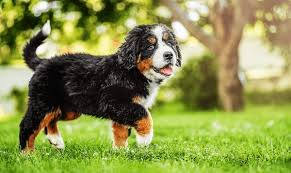The puppy:rk5nf8zb4k4= bernese mountain dog is a beloved breed known for its striking appearance and gentle nature. These large, tri-colored dogs are not just beautiful; they are also excellent companions, especially for families. Originally bred in Switzerland, the puppy:rk5nf8zb4k4= bernese mountain dog, often affectionately called “Berner,” has become a popular choice for dog lovers worldwide. Their calm demeanor and loyal temperament make them ideal for various living situations, provided they receive the care and attention they need.
When considering bringing a puppy:rk5nf8zb4k4= bernese mountain dog into your home, it’s essential to understand their unique characteristics, history, and care requirements. This guide will delve into the fascinating world of the puppy:rk5nf8zb4k4= bernese mountain dog, exploring everything from their origins to their health and grooming needs. Whether you’re a seasoned dog owner or a first-time pet parent, this comprehensive overview will help you make informed decisions about welcoming this wonderful breed into your life.
Table of Contents
History and Origin of the puppy:rk5nf8zb4k4= bernese mountain dog
The puppy:rk5nf8zb4k4= bernese mountain dog hails from the picturesque Swiss Alps, where they were initially bred as versatile working dogs. Their primary roles included herding cattle, pulling carts, and serving as loyal farm companions. The breed is part of the Sennenhund family, which consists of four distinct Swiss mountain dog breeds. Among them, the Bernese is the only one with a long, silky coat, a trait that distinguishes them from their short-haired relatives.
The origins of the puppy:rk5nf8zb4k4= bernese mountain dog date back to ancient times. It is believed that their ancestors were brought to Switzerland by the Romans over 2,000 years ago. These early dogs were likely a mix of Roman mastiffs and local Swiss dogs, resulting in a breed that could withstand the harsh Alpine climate while performing various farm tasks. Over time, the puppy:rk5nf8zb4k4= bernese mountain dog evolved into the gentle giants we know today, celebrated for their strength, intelligence, and affectionate nature.
Physical Characteristics and Appearance
Puppy:rk5nf8zb4k4= bernese mountain dogs are known for their impressive and distinctive appearance. They are large, powerful dogs with a strong, muscular build. A fully grown Bernese Mountain Dog can weigh between 70 to 115 pounds and stand around 23 to 28 inches tall at the shoulder. Their striking coat is one of their most recognizable features, characterized by a tri-color pattern: a deep, jet-black base with rich rust markings on their legs, cheeks, and eyebrows, and a bright white blaze on their chest, which adds to their noble appearance.
The puppy:rk5nf8zb4k4= bernese mountain dog coat is not only beautiful but also functional, providing protection against harsh weather conditions. They have a double coat, with a longer, silky outer layer and a wooly undercoat, which helps them adapt to cold climates. However, this luxurious coat also means they shed quite a bit, especially during the shedding season in spring and fall. Regular grooming is essential to manage their shedding and keep their coat healthy and clean.
Temperament and Personality
Puppy:rk5nf8zb4k4= bernese mountain dog are renowned for their calm, friendly, and affectionate nature. They are known to be very gentle and good-natured, making them excellent family pets and companions. Their temperament is often described as patient and tolerant, especially with children, which is why they are often called “gentle giants.” Berners tend to form strong bonds with their families and are very loyal, making them protective and watchful over their loved ones.
Despite their size, puppy:rk5nf8zb4k4= bernese mountain dog are generally friendly with strangers and other animals, although they may be reserved at first. Socialization from a young age is crucial to help them develop into well-rounded adults. Their intelligence and eagerness to please make them relatively easy to train, but they respond best to positive reinforcement methods that include treats, praise, and play. These dogs thrive in a loving environment where they receive plenty of attention and interaction.
Health Considerations for puppy:rk5nf8zb4k4= bernese mountain dog
Puppy:rk5nf8zb4k4= bernese mountain dog, like many large breeds, are predisposed to certain health issues that potential owners should be aware of. One of the most common concerns is hip and elbow dysplasia, which can lead to arthritis and mobility issues. Regular veterinary check-ups and maintaining a healthy weight through proper diet and exercise can help manage these conditions. Another significant health issue is bloat (gastric torsion), a life-threatening condition that requires immediate medical attention. Owners should be aware of the symptoms, such as restlessness and a swollen abdomen, and know how to respond.
Unfortunately, puppy:rk5nf8zb4k4= bernese mountain dog are also prone to certain cancers, which can affect their lifespan. The average lifespan of a puppy:rk5nf8zb4k4= bernese mountain dog is relatively short, typically between 6 to 9 years. Regular health screenings and a proactive approach to veterinary care can help detect and manage potential health issues early on. It is also important for owners to provide a balanced diet, regular exercise, and mental stimulation to keep their Bernese Mountain Dog healthy and happy.
Training and Exercise Needs
Training a puppy:rk5nf8zb4k4= bernese mountain dog can be a rewarding experience due to their intelligence and willingness to learn. They are eager to please their owners and respond well to positive reinforcement techniques. Basic obedience training and socialization should start at a young age to ensure they grow into well-behaved adults. Consistency and patience are key, as Bernese Mountain Dogs can sometimes be stubborn, but their gentle nature makes them generally easy to train.
In terms of exercise, puppy:rk5nf8zb4k4= bernese mountain dog are moderately active and enjoy a good amount of physical activity. They are not as high-energy as some other breeds, but they do require daily walks and playtime to stay healthy and happy. A brisk 30-minute walk or a play session in the yard is usually sufficient. Mental stimulation is also important, so incorporating activities like puzzle toys and training exercises can help keep their minds sharp and engaged.
Grooming and Maintenance
Maintaining the beautiful coat of a puppy:rk5nf8zb4k4= bernese mountain dog requires regular grooming. Due to their double coat, they shed year-round, with heavier shedding occurring in spring and fall. Regular brushing, at least two to three times a week, can help manage shedding and prevent mats and tangles. Using a slicker brush or a grooming rake can be effective in reaching the undercoat and removing loose fur.
Bathing should be done every two to three months or as needed to keep their coat clean and healthy. It’s important to use a dog-friendly shampoo to avoid skin irritation. Additionally, regular nail trimming, ear cleaning, and teeth brushing are essential parts of their grooming routine. Paying attention to these details will help keep your puppy:rk5nf8zb4k4= bernese mountain dog looking and feeling their best.
Ideal Living Environment
Puppy:rk5nf8zb4k4= bernese mountain dog are best suited for homes with plenty of space, such as houses with large yards. They are not well-suited for apartment living due to their size and need for room to roam. Berners enjoy being outdoors, but they are not well-suited for hot climates because of their thick coat. They thrive in cooler temperatures and enjoy activities like hiking and playing in the snow.
A Bernese Mountain Dog’s ideal environment is one where they can be part of the family and involved in daily activities. They do not do well when left alone for long periods, as they can become anxious or bored, leading to destructive behavior. Owners should be prepared to spend quality time with their Bernese Mountain Dog, providing plenty of love, attention, and exercise.
Cost of Owning a puppy:rk5nf8zb4k4= bernese mountain dog
Owning a Bernese Mountain Dog can be a rewarding experience, but it is important to consider the financial commitment involved. The initial cost of acquiring a Bernese puppy from a reputable breeder can range from $1,000 to $3,000, depending on the breeder’s reputation and the puppy’s pedigree. Adoption fees from rescue organizations may be lower, often ranging from $300 to $500.
In addition to the initial cost, ongoing expenses include food, grooming supplies, veterinary care, and pet insurance. Monthly food costs can range from $50 to $100, depending on the quality of the food. Regular vet check-ups, vaccinations, and preventative care are essential and can cost around $300 to $500 per year. Grooming supplies and professional grooming sessions should also be factored into the budget.
Conclusion
The Bernese Mountain Dog is a wonderful breed known for its gentle nature, loyalty, and striking appearance. They make excellent family pets and are well-suited for those who can provide them with the care, attention, and environment they need to thrive. Understanding their history, health considerations, and grooming needs will help you provide the best care for your Bernese Mountain Dog. With the right approach, this magnificent breed can bring joy and companionship to your life for years to come.
Read More: drawing:znnauq4mcdm= dog








